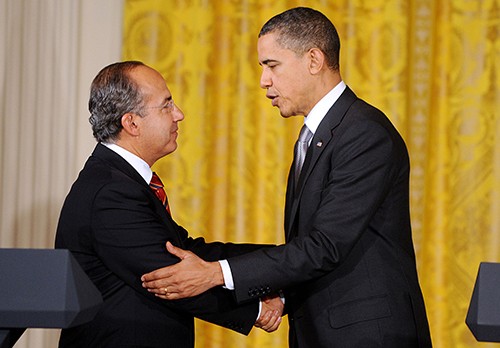WASHINGTON — For the first time, President Barack Obama called publicly and personally Thursday for Libyan dictator Moammar Gadhafi to go, said he had authorized U.S. military aircraft to help evacuate refugees at the Libyan border and said the U.S. might need to intervene more there to get food to starving civilians.
The president’s remarks came during a news conference at the White House, where he stood with visiting Mexican President Felipe Calderon. Obama also touched on relations with Mexico and the National Football League’s looming labor showdown.
On Libya, when he was asked whether he has a broad doctrine for military intervention, Obama said his doctrine was “”no violence against citizens”” and “”we stand for freedom and democracy.””
“”I don’t want us hamstrung,”” the president said. But he stopped short of calling for a no-fly zone to prevent Gadhafi from using airstrikes against those who are seeking his overthrow, or calling for military assistance to them. He said that while he was “”looking at every option that’s out there”” he also was mindful that doing more could raise geopolitical problems.
Obama’s discussion of Libya upstaged a major announcement that he and Calderon had reached an agreement to end a nearly two-decade impasse and open U.S. highways to Mexican trucks. The proposal could go before Congress this spring for approval.
Obama first called for Gadhafi to leave power five days ago, but he did so indirectly, through a printed White House statement that described a private conversation he’d had with German Chancellor Angela Merkel. In making the demand Thursday in person before TV cameras that “”Col. Gadhafi needs to step down from power and leave,”” Obama turned up his volume, but still, he didn’t say what he’s willing to do to make it happen.
The president said he recognized that without foreign intervention, “”there is a danger of a stalemate that over time could be bloody.”” Gadhafi is thought to have killed hundreds and perhaps thousands of civilians since the uprising against his repressive 42-year regime began two weeks ago.
Even so, Obama hinted that the United States, spread thin by two long wars in Iraq and Afghanistan that have inflamed Muslim resentment of America, may not be ready or willing to take sustained unilateral action. He repeated his desire to coordinate any action with other nations.
“”What I want to make sure of is that the United States has full capacity to act potentially rapidly,”” he said.
He signaled reluctance for any intervention that might stir more resentment against the United States.
Recalling how Egyptian protesters forced Hosni Mubarak from power last month, Obama said that one of the “”extraordinary successes”” then was “”the full ownership that the Egyptian people felt for that transformation. That has served the Egyptian people well. It serves U.S. interests well. We did not see anti-American sentiment arising out of that movement in Egypt precisely because they felt that we hadn’t tried to engineer or impose a particular outcome, but rather they owned it.””
Turning to Mexico, Obama offered strong support for Calderon, whose popularity at home is sagging as Mexicans grow weary of drug-related violence, which has taken more than 35,000 lives since he came to office in late 2006.
“”He’s taken the hard path. And he’s shown great courage and great risk in doing so,”” Obama said.
As for whether Mexico should allow U.S. agents to arm themselves when they’re working there — since Jaime Zapata, a U.S. Immigration and Customs Enforcement agent, was slain Feb. 15 in central Mexico — Calderon said he didn’t see any way.
“”The law does not permit it,”” he said. Calderon added that he would work with Mexico’s Congress to ensure the safety of U.S. officials who are fighting drug gangs in his country.
Similarly, when a Mexican reporter asked Obama what he could do to limit gun rights in the United States because many U.S. weapons are flooding into Mexico, Obama said he was bound by and believed in the Second Amendment to the Constitution, which protects Americans’ right to bear arms.
“”We believe that we can shape an enforcement strategy that slows the flow of guns into Mexico while at the same time preserving our Constitution,”” Obama said.
Calderon finessed one potential embarrassment that recently rose from leaked U.S. diplomatic cables criticizing his government’s poor coordination against drug cartels. Last week, in an interview with Mexico’s newspaper El Universal, Calderon said that Carlos Pascual, the U.S. ambassador to Mexico, suffered from ignorance. But Thursday, Calderon had only praise for Washington. “”Today we have reached increased levels of exchange of information that are unheard of in the past,”” he said.
As for the NFL’s labor problems, Obama said, “”I’m a big football fan, but I also think that for an industry that’s making $9 billion a year in revenue, they can figure out how to divide it up. … My expectation and hope is that they will resolve it without me intervening, because it turns out I’ve got a lot of other stuff to do.””









